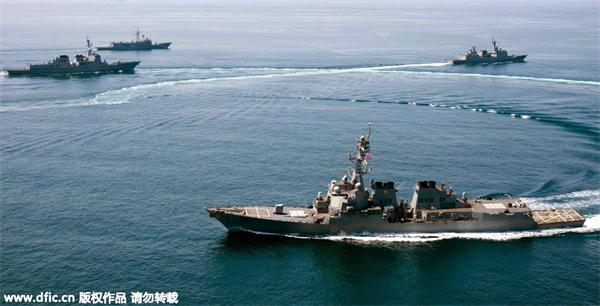China hopes US, ASEAN honor 'self-restraint' pledge
By ZHANG YUNBI (China Daily) Updated: 2016-02-18 03:06
 |
|
The guided-missile destroyer USS Lassen (front) conducts a trilateral naval exercise with the Turkish and South Korean Navy on May 25, 2015. [Photo/IC] |
Beijing hopes that commitments "will be honored by actions" after the United States and the leaders of Southeast Asian nations pledged "non-militarization" in a joint statement following a two-day gathering.
US President Barack Obama wrapped up his meetings with leaders of the Association of Southeast Asian Nations member states at Sunnylands in California on Tuesday, and a statement released afterward said they share a commitment to "non-militarization and self-restraint in the conduct of activities".
Foreign Minister Wang Yi said on Wednesday that "China has taken notice" of the statement and hopes that the US and ASEAN countries match their words with actions.
Last month, tension was stirred again in the South China Sea as a US Navy destroyer intruded in Chinese territorial waters off the Xisha Islands.
"Non-militarization serves the interests of all parties. However, non-militarization should not target a single country and should not be applied with double or multiple standards," Wang told a joint news conference in Beijing on Wednesday with his visiting Australian counterpart, Julie Bishop.
"The non-militarization in the South China Sea needs joint efforts by relevant countries inside and outside the region," Wang added.
Zhou Yongsheng, a professor of international relations at China Foreign Affairs University, said that the US has embarked on the most frequent and the most provocative military activities in the South China Sea.
"The US has boosted warships patrolling in the South China Sea and made incursions into territorial waters of sovereign states. … Such practices obviously have run against what it advocates as 'non-militarization'," Zhou said.
Reuters said US officials had been hoping to arrive at a common position on the South China Sea at the gathering. However, not all ASEAN members agreed on how to handle disputes in the region, it said.
Although the Philippines, an ASEAN member, is seeking international arbitration against China over the South China Sea issue, the statement on Tuesday did not directly name China.






